
The Volvo S60 is a compact executive car manufactured and marketed by Volvo since 2000.

The Lotus Europa name is used on two distinct mid-engine GT cars built by British automobile manufacturer Lotus Cars. The original Europa and its variants comprise the Lotus Types 46, 47, 54, 65 and 74, and were produced between 1966 and 1975.

Suspension is the system of tires, tire air, springs, shock absorbers and linkages that connects a vehicle to its wheels and allows relative motion between the two. Suspension systems must support both road holding/handling and ride quality, which are at odds with each other. The tuning of suspensions involves finding the right compromise. It is important for the suspension to keep the road wheel in contact with the road surface as much as possible, because all the road or ground forces acting on the vehicle do so through the contact patches of the tires. The suspension also protects the vehicle itself and any cargo or luggage from damage and wear. The design of front and rear suspension of a car may be different.

Hydropneumatic suspension is a type of motor vehicle suspension system, designed by Paul Magès, invented by Citroën, and fitted to Citroën cars, as well as being used under licence by other car manufacturers. Similar systems are also widely used on modern tanks and other large military vehicles. The suspension was referred to as Suspension oléopneumatique in early literature, pointing to oil and air as its main components.

The Ferrari F50 is a mid-engine sports car manufactured by Italian automobile manufacturer Ferrari from 1995 until 1997. Introduced in 1995, the car is a two-door, two seat targa top. The F50 is powered by a 4.7 L naturally aspirated Tipo F130B 60-valve V12 engine that was developed from the 3.5 L V12 used in the 1990 Ferrari 641 Formula One car. The car's design is an evolution of the 1989 Ferrari Mythos concept car.
Automobile handling and vehicle handling are descriptions of the way a wheeled vehicle responds and reacts to the inputs of a driver, as well as how it moves along a track or road. It is commonly judged by how a vehicle performs particularly during cornering, acceleration, and braking as well as on the vehicle's directional stability when moving in steady state condition.

The Ferrari F355 is a sports car manufactured by Italian car manufacturer Ferrari produced from May 1994 until 1999. The car is a heavily revised Ferrari 348 with notable exterior and performance changes. The F355 was succeeded by the all-new Ferrari 360 in 1999.

The Lotus Exige is a sports car made by the British company Lotus Cars from 2000 until 2021. Originally a coupé version of the Lotus Elise roadster, since the Series 3 the Exige has been the larger-engined model of the family, featuring a V6 engine in place of the Elise's straight-four. Convertible versions of both models are available.
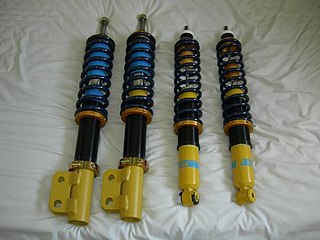
A coilover is an automobile suspension device. The name coilover is an abbreviation of "coil over shock absorber".
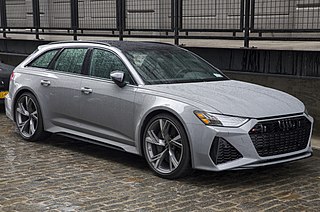
The Audi RS 6 is a high-performance variant of the Audi A6 range, produced by the high-performance subsidiary company Audi Sport GmbH, for its parent company Audi AG, a subsidiary of the Volkswagen Group, from 2002 onwards.

The Infiniti QX70, formerly called the Infiniti FX until 2013, is a compact luxury crossover SUV produced by the Nissan-owned Infiniti luxury vehicle brand between 2002 and 2019. The FX replaced the QX4 as Infiniti's mid-size SUV. It shares the same FM platform as the rear-wheel drive Nissan 370Z, and it "made no claims of climbing mountains." Rather, its aggressive shape promised style and quick handling. The similarly sized Nissan Murano is based on the same D platform as the front-wheel drive Nissan Altima. The FX does not have a Nissan-branded equivalent and is not sold in Japan.
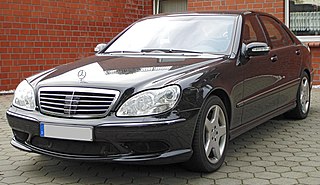
Active Body Control, or ABC, is the Mercedes-Benz brand name used to describe electronically controlled hydropneumatic suspension.

Ride height or ground clearance is the amount of space between the base of an automobile tire and the lowest point of the automobile, typically the bottom exterior of the differential housing ; or, more properly, to the shortest distance between a flat, level surface, and the lowest part of a vehicle other than those parts designed to contact the ground. Ground clearance is measured with standard vehicle equipment, and for cars, is usually given with no cargo or passengers.
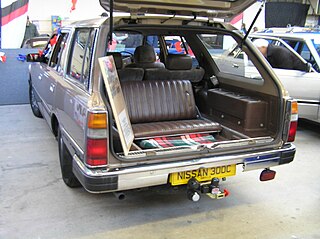
The Nissan 300C was the export version of the Nissan Cedric Y30 series, a luxury car made by the Japanese manufacturer Nissan. It was produced between 1984 and 1987 and available as a saloon and an estate.
The Chevrolet Engineering Research Vehicle (CERV) is a series of Chevrolet experimental cars. Chevrolet Staff engineer, designer, and race car driver Zora Arkus-Duntov started development of the CERV I in 1959, and began work on the CERV II in 1963. Chevrolet chief engineer Don Runkle and Lotus' Tony Rudd discussed creating a new show car to demonstrate their engineering expertise in 1985; It would become the CERV III. Corvette chief engineer Dave Hill unveiled the CERV IV in 1993, a test vehicle for the 1997 C5 Corvette.

The Caterham Seven CSR is the latest model from sports car manufacturer Caterham Cars. The CSR is the most heavily modified Caterham, though it still retains the basic look of the Super Seven. The CSR has two engine options based on the same Duratec block, though modifications and power output differ. The entry level engine produces 200 bhp (149 kW), with a 0–60 mph (0–97 km/h) time of 3.7 seconds. The upgraded engine produces 260 bhp (194 kW), with a 0–60 mph (0–97 km/h) time of 3.1 seconds and a top speed of 155 mph (249 km/h).

The Maserati GranTurismo and GranCabrio are a series of grand tourers produced by the Italian manufacturer Maserati, succeeding the Maserati Coupé and Spyder.

The second generation of the Subaru Impreza compact car was introduced in 2000 and manufactured up to 2007 by Subaru in Ōta, Gunma, Japan, in both sedan and five-door Hatchback bodystyles, as well as two intermediate facelifts throughout its lifespan.
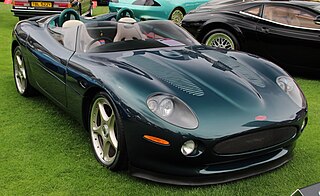
The Jaguar XK 180 is a concept car created by the British car manufacturer Jaguar Cars to celebrate the 50th anniversary of the XK car and to show the world the skills of Jaguar stylists, craftsmen and engineers. It was presented at the Paris Motor Show in 1998.

Korres Engineering, founded by architect and engineer Dimitris Korres in Athens, mainly focuses on design, consulting and subcontracting for civil engineering projects. It particularly specializes in complex structure relocation, while other branches undertake customized engineering tasks and vehicle design and development. Over the last two decades, it has completed dozens of challenging relocations of structures which include several ancient and medieval monuments and heavy structures such as an 1800-tonne 3-storey stone building of the Hellenic Railways Organization.

















